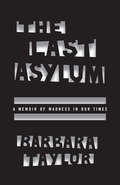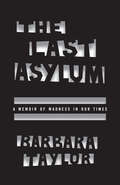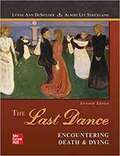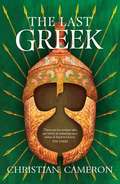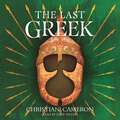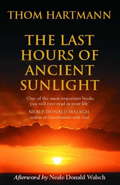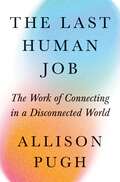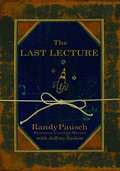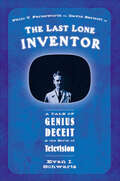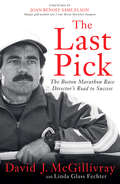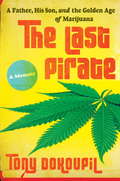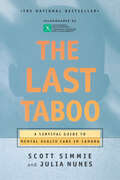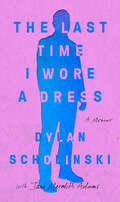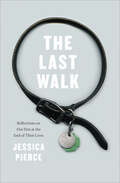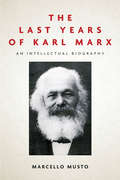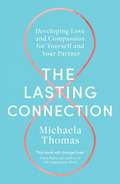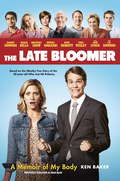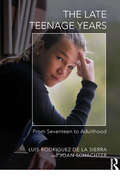- Table View
- List View
The Last Asylum: A Memoir of Madness in Our Times
by Barbara TaylorIn the late 1970s, Barbara Taylor, then an acclaimed young historian, began to suffer from severe anxiety. In the years that followed, Taylor's world contracted around her illness. Eventually, her struggles were severe enough to lead to her admission to what had once been England's largest psychiatric institution, the infamous Friern Mental Hospital in North London. The Last Asylum is Taylor's breathtakingly blunt and brave account of those years. In it, Taylor draws not only on her experience as a historian, but also, more importantly, on her own lived history at Friern-- once known as the Colney Hatch Lunatic Asylum and today the site of a luxury apartment complex. Taylor was admitted to Friern in July 1988, not long before England's asylum system began to undergo dramatic change: in a development that was mirrored in America, the 1990s saw the old asylums shuttered, their patients left to plot courses through a perpetually overcrowded and underfunded system of community care. But Taylor contends that the emptying of the asylums also marked a bigger loss, a loss of community. She credits her own recovery to the help of a steadfast psychoanalyst and a loyal circle of friends-- from Magda, Taylor's manic-depressive roommate, to Fiona, who shares tips for navigating the system and stories of her boyfriend, the "Spaceman," and his regular journeys to Saturn. The forging of that network of support and trust was crucial to Taylor's recovery, offering a respite from the "stranded, homeless feelings" she and others found in the outside world. A vivid picture of mental health treatment at a moment of epochal change, The Last Asylum is also a moving meditation on Taylor's own experience, as well as that of millions of others who struggle with mental illness.
The Last Asylum: A Memoir of Madness in Our Times
by Barbara TaylorIn the late 1970s, Barbara Taylor, then an acclaimed young historian, began to suffer from severe anxiety. In the years that followed, Taylor’s world contracted around her illness. Eventually, her struggles were severe enough to lead to her admission to what had once been England’s largest psychiatric institution, the infamous Friern Mental Hospital in North London.The Last Asylum is Taylor’s breathtakingly blunt and brave account of those years. In it, Taylor draws not only on her experience as a historian, but also, more importantly, on her own lived history at Friern— once known as the Colney Hatch Lunatic Asylum and today the site of a luxury apartment complex. Taylor was admitted to Friern in July 1988, not long before England’s asylum system began to undergo dramatic change: in a development that was mirrored in America, the 1990s saw the old asylums shuttered, their patients left to plot courses through a perpetually overcrowded and underfunded system of community care. But Taylor contends that the emptying of the asylums also marked a bigger loss, a loss of community. She credits her own recovery to the help of a steadfast psychoanalyst and a loyal circle of friends— from Magda, Taylor’s manic-depressive roommate, to Fiona, who shares tips for navigating the system and stories of her boyfriend, the “Spaceman,” and his regular journeys to Saturn. The forging of that network of support and trust was crucial to Taylor’s recovery, offering a respite from the “stranded, homeless feelings” she and others found in the outside world. A vivid picture of mental health treatment at a moment of epochal change, The Last Asylum is also a moving meditation on Taylor’s own experience, as well as that of millions of others who struggle with mental illness.
The Last Dance: Encountering Death and Dying
by Albert Lee Strickland Lynne Ann DeSpelder Jeanette M. Potts Marion MasonThe Last Dance: Encountering Death and Dying provides a comprehensive, up to date, and readable introduction to the study of death and dying. It directs attention to the evolving understanding of death and dying in today's culturally diverse environment. In a straightforward, conversational style, with an extensively illustrated format, The Last Dance provides a solid grounding in theory and research as well as in methods for applying what is learned to readers' own circumstances, both personal and professional. No other textbook so successfully combines the research and theories of such diverse disciplines as anthropology, art, ethics, health science, literature, philosophy, psychology, public policy, religion, and sociology. The eleventh edition of The Last Dance includes coverage of key topics yet retains the focus, writing, and pedagogy instructors have come to expect from the best-selling text in death studies.
The Last Good Funeral of the Year: A Memoir
by Ed O'LoughlinSoon, the lockdown would start. People would die alone, without any proper ceremony. Charlotte's death would be washed away, the first drop in a downpour. Nobody knew it then but hers would be the last good funeral of the year.It was February 2020, when Ed O'Loughlin heard that Charlotte, a woman he'd known had died, young and before her time. He realised that he was being led to reappraise his life, his family and his career as a foreign correspondent and acclaimed novelist in a new, colder light. He was suddenly faced with facts that he had been ignoring, that he was getting old, that he wasn't what he used to be, that his imagination, always over-active, had at some point reversed its direction, switching production from dreams to regrets. He saw he was mourning his former self, not Charlotte. The search for meaning becomes the driving theme of O'Loughlin's year of confinement. He remembers his brother Simon, a suicide at thirty; the journalists and photographers with whom he covered wars in Africa, the Middle East, the Balkans, wars that are hard to explain and never really stopped; his habit of shedding baggage, an excuse for hurrying past and not dwelling on things.Moving, funny, and searingly honest, The Last Good Funeral of the Year takes the reader on a circular journey from present to past and back to the present: 'Could any true story end any other way?'
The Last Good Funeral of the Year: A Memoir
by Ed O'LoughlinSoon, the lockdown would start. People would die alone, without any proper ceremony. Charlotte's death would be washed away, the first drop in a downpour. Nobody knew it then but hers would be the last good funeral of the year.It was February 2020, when Ed O'Loughlin heard that Charlotte, a woman he'd known had died, young and before her time. He realised that he was being led to reappraise his life, his family and his career as a foreign correspondent and acclaimed novelist in a new, colder light. He was suddenly faced with facts that he had been ignoring, that he was getting old, that he wasn't what he used to be, that his imagination, always over-active, had at some point reversed its direction, switching production from dreams to regrets. He saw he was mourning his former self, not Charlotte. The search for meaning becomes the driving theme of O'Loughlin's year of confinement. He remembers his brother Simon, a suicide at thirty; the journalists and photographers with whom he covered wars in Africa, the Middle East, the Balkans, wars that are hard to explain and never really stopped; his habit of shedding baggage, an excuse for hurrying past and not dwelling on things.Moving, funny, and searingly honest, The Last Good Funeral of the Year takes the reader on a circular journey from present to past and back to the present: 'Could any true story end any other way?'(P)2022 Quercus Editions Limited
The Last Greek (Commander #2)
by Christian CameronFew writers are better at conjuring up a vision of Ancient Greece' THE TIMES* * * * * * *210BCE.The most powerful empires in the world brawl over the spoils of a declawed Greece.Philopoemen has a vision to end the chaos and anarchy that consumes his homeland - to stop the endless wars and preserve the world he loves. He must resist the urge of the oligarchs to surrender to their oppressors and raise an army to defend his countrymen from the all-conquering powers of Sparta, Macedon and Rome.It is the last roll of the dice for the Achean League. The moment Philopoemen has been training for his whole life.The new Achilles is poised to restore the glory of the former empire. To herald a new era.To become the last great hero of Greece.* * * * * * *Praise for Christian Cameron:'One of the finest writers of historical fiction in the world' BEN KANE'The master of historical fiction' SUNDAY TIMES'A storyteller at the height of his powers' HISTORICAL NOVEL SOCIETY
The Last Greek (Commander #2)
by Christian CameronFew writers are better at conjuring up a vision of Ancient Greece' THE TIMES* * * * * * *210BCE.The most powerful empires in the world brawl over the spoils of a declawed Greece.Philopoemen has a vision to end the chaos and anarchy that consumes his homeland - to stop the endless wars and preserve the world he loves. He must resist the urge of the oligarchs to surrender to their oppressors and raise an army to defend his countrymen from the all-conquering powers of Sparta, Macedon and Rome.It is the last roll of the dice for the Achean League. The moment Philopoemen has been training for his whole life.The new Achilles is poised to restore the glory of the former empire. To herald a new era.To become the last great hero of Greece.* * * * * * *Praise for Christian Cameron:'One of the finest writers of historical fiction in the world' BEN KANE'The master of historical fiction' SUNDAY TIMES'A storyteller at the height of his powers' HISTORICAL NOVEL SOCIETY
The Last Greek (Commander #2)
by Christian CameronFew writers are better at conjuring up a vision of Ancient Greece' THE TIMES* * * * * * *210BCE.The most powerful empires in the world brawl over the spoils of a declawed Greece.Philopoemen has a vision to end the chaos and anarchy that consumes his homeland - to stop the endless wars and preserve the world he loves. He must resist the urge of the oligarchs to surrender to their oppressors and raise an army to defend his countrymen from the all-conquering powers of Sparta, Macedon and Rome.It is the last roll of the dice for the Achean League. The moment Philopoemen has been training for his whole life.The new Achilles is poised to restore the glory of the former empire. To herald a new era.To become the last great hero of Greece.* * * * * * *Praise for Christian Cameron:'One of the finest writers of historical fiction in the world' BEN KANE'The master of historical fiction' SUNDAY TIMES'A storyteller at the height of his powers' HISTORICAL NOVEL SOCIETY
The Last Hours Of Ancient Sunlight: Waking up to personal and global transformation
by Thom HartmannThe world is reaching crisis point, as population growth escalates out of control, and species and cultures are being destroyed. With humans across the globe encroaching further and further upon Earth's resources, the realisation that the supply is finite has dawned and we now face the urgent dilemma of knowing how to create a sustainable future for ourselves. In this important book, award-winning author and international lecturer Thom Hartmann puts forward his lasting solution to our survival. Teaching us a new way of seeing, Hartmann introduces us to the lessons of our ancient ancestors - those which allowed sustainable living for many thousands of years but which we've forgotten. It is a call for consciousness combining spirituality and ecology that offers real hope for the future.
The Last Human Job: The Work of Connecting in a Disconnected World
by Allison J. PughA timely and urgent argument for preserving the work that connects us in the age of automationWith the rapid development of artificial intelligence and labor-saving technologies like self-checkouts and automated factories, the future of work has never been more uncertain, and even jobs requiring high levels of human interaction are no longer safe. The Last Human Job explores the human connections that underlie our work, arguing that what people do for each other in these settings is valuable and worth preserving.Drawing on in-depth interviews and observations with people in a broad range of professions—from physicians, teachers, and coaches to chaplains, therapists, caregivers, and hairdressers—Allison Pugh develops the concept of &“connective labor,&” a kind of work that relies on empathy, the spontaneity of human contact, and a mutual recognition of each other&’s humanity. The threats to connective labor are not only those posed by advances in AI or apps; Pugh demonstrates how profit-driven campaigns imposing industrial logic shrink the time for workers to connect, enforce new priorities of data and metrics, and introduce standardized practices that hinder our ability to truly see each other. She concludes with profiles of organizations where connective labor thrives, offering practical steps for building a social architecture that works.Vividly illustrating how connective labor enriches the lives of individuals and binds our communities together, The Last Human Job is a compelling argument for us to recognize, value, and protect humane work in an increasingly automated and disconnected world.
The Last Lecture
by Randy PauschWhen they retire, many professors give talks titled "The Last Lecture" where they speak about what they view as their legacy. When Pausch was diagnosed with terminal cancer, the lecture he gave, "Really Achieving Your Childhood Dreams," wasn't about dying. It was about the importance of overcoming obstacles, of enabling the dreams of others, of seizing every moment because "time is all you have ...and you may find one day that you have less than you think."
The Last Lone Inventor: A Tale of Genius, Deceit, and the Birth of Television
by Evan I. Schwartz“…Fascinating… A riveting American classic of independent brilliance versus corporate arrogance. I found it more fun than fiction.” — James Bradley, author of Flags of Our Fathers“… The fascinating inside story of how this eccentric loner invented television and fought corporate America.” — Walter Isaacson, chariman, CNN“…Compelling…Strong, dramatic prose…” — Kirkus Reviews“…A lively and engaging account.” — Library Journal“[A] gripping and eminently readable saga of the birth of television and the death of the Edisonian myth.” — Darwin magazine
The Last Pick: The Boston Marathon Race Director's Road to Success
by David J. Mcgillivray Linda Glass Fechter<p>"If you can dream it, it can happen." In this heartening book, Boston Marathon race director and motivational speaker David McGillivray shares the challenges he has overcome to inspire readers to similar triumphs in their own lives. <p>Always the last pick for team sports because of his small stature, David McGillivray drove himself to excel at individual sports. <p>When he was 16, he set himself up for the one "failure" that would motivate the rest of his life. <p>He attempted to run in his first Boston Marathon--without training for the event. Not crossing the finish line could have been a crushing blow. <p>Instead he went on to complete 115 marathons and eventually to become the Boston Marathon's race director. <p>At age 23, McGillivray completed his celebrated 3,452-mile run across the United States to raise money for cancer research. <p>The story of his journey and what he learned about himself will give all readers a new understanding of how to prepare for and achieve success. <p>McGillivray's many accomplishments will convince readers that virtually any goal is possible. <p>This book will motivate them to overcome the mental obstacles that often keep dreams from becoming reality.
The Last Pirate
by Tony DokoupilIn the tradition of Blow and Another Bullshit Night in Suck City, The Last Pirate is a vivid, haunting and often hilarious memoir recounting the life of Big Tony, a family man who joined the biggest pot ring of the Reagan era and exploded his life in the process. Three decades later, his son came back to put together the pieces.As he relates his father's rise from hey-man hippie dealer to multi-ton smuggler extraordinaire, Tony Dokoupil tells the larger history of marijuana and untangles the controversies still stirring furious debate today. He blends superb reportage with searing personal memories, presenting a probing chronicle of pot-smoking, drug-taking America from the perspective of the generation that grew up in the aftermath of the Great Stoned Age. Back then, everyone knew a drug dealer. The Last Pirate is the story of what happened to one of them, to his family, and in a pharmacological sense, to us all. The Last Pirate is a cultural portrait of marijuana's endless allure set against the Technicolor backdrop of South Florida in the era of Miami Vice. It's a public saga complete with a real pirate's booty: more than a million dollars lost, buried, or stolen--but it's also a deeply personal pursuit, the product of a son's determination to replant the family tree in richer soil.From the Hardcover edition.
The Last Samurai
by Helen DeWittCalled “remarkable” (The Wall Street Journal) and “an ambitious, colossal debut novel” (Publishers Weekly), Helen DeWitt’s The Last Samurai is back in print at last Helen DeWitt’s 2000 debut, The Last Samurai, was “destined to become a cult classic” (Miramax). The enterprising publisher sold the rights in twenty countries, so “Why not just, ‘destined to become a classic?’” (Garth Risk Hallberg) And why must cultists tell the uninitiated it has nothing to do with Tom Cruise? Sibylla, an American-at-Oxford turned loose on London, finds herself trapped as a single mother after a misguided one-night stand. High-minded principles of child-rearing work disastrously well. J. S. Mill (taught Greek at three) and Yo Yo Ma (Bach at two) claimed the methods would work with any child; when these succeed with the boy Ludo, he causes havoc at school and is home again in a month. (Is he a prodigy, a genius? Readers looking over Ludo’s shoulder find themselves easily reading Greek and more.) Lacking male role models for a fatherless boy, Sibylla turns to endless replays of Kurosawa’s masterpiece Seven Samurai. But Ludo is obsessed with the one thing he wants and doesn’t know: his father’s name. At eleven, inspired by his own take on the classic film, he sets out on a secret quest for the father he never knew. He’ll be punched, sliced, and threatened with retribution. He may not live to see twelve. Or he may find a real samurai and save a mother who thinks boredom a fate worse than death.
The Last Taboo: A Survival Guide to Mental Health Care in Canada
by Julia Nunes Scott SimmieAt any given time, three million Canadians are living with some kind of mental illness. But despite its prevalence, the public and even some health practitioners are badly misinformed about its causes and treatment.This book is an essential road map to hope and recovery. It tells the reader where to get help and what pitfalls to avoid. It defines the most common forms of mental illness, discusses the advantages and drawbacks of medication, and tackles the ultimate taboo of suicide. It offers coping strategies for consumers, family members, friends, and employers, and demonstrates how they can all contribute to the recovery of a person with a mental illness. Medication and psychotherapy only go so far - housing, meaningful activity, and friendships are as crucial to recovery as any drug.In The Last Taboo, Scott Simmie recounts his own battle with a serious mental disorder, and his partner, Julia Nunes, provides a care-giver and supporter's perspective on living with a mentally ill loved-one. Throughout they include the real stories of other Canadians, who give their own perspectives on the successes and failures of the health care system.* In any given year, one in five Canadians will experience symptoms of mental disorder* The Last Taboo provides sympathetic advice and practical information on: the causes of mental disorder/mood disorders, including depression and bipolar affective disorder / anxiety disorders / substance abuse / eating disorders / personality disorders / schizophrenia / where to go for help / giving help / medication / psychotherapy / alternative medicine / stigma / suicide* Includes Appendix, Glossary, Useful Books, and Useful WebsitesFrom the Hardcover edition.
The Last Time I Wore a Dress
by Dylan ScholinskiUPDATED WITH A NEW EPILOGUE At fifteen years old, Daphne Scholinski was committed to a mental institution and awarded the dubious diagnosis of Gender Identity Disorder. For three years and more than a million dollars of insurance, the problem was &“treated&”—with makeup lessons and instructions in how to walk like a girl. With a new epilogue by Scholinski, whose name is now Dylan and who identifies as nonbinary, this revised paperback edition of The Last Time I Wore a Dress looks back at those experiences and their life since. It chronicles the journey of coming into oneself and gaining a nuanced, freeing understanding of being born transgender. This memoir tells Dylan Scholinski&’s remarkable story in an honest, unforgettable voice that&’s both heartbreaking and hopeful.
The Last Tree Town
by Beth Turley&“A sensitive story of family, friendship, and personal growth.&” —Kirkus Reviews From the author of If This Were a Story comes a heartfelt, coming-of-age novel about sisterhood, friendship, and the stories behind our journeys that connect us to one another.Cassi has always been proud to be Puerto Rican, but when others comment on her appearance, telling her she doesn&’t look like the rest of her family, Cassi begins to question everything. At school, Cassi finds a distraction in the Math Olympics, where she is able to do what she loves and soon befriends Aaron, the new boy who tells her stories about all the tree towns he&’s lived in. Just when everything seems to be getting better, a painful video goes viral and Cassi wonders if Mapleton is just another stop on Aaron&’s list. As the seasons change, Cassi must learn to solve the pieces of her life that are varied and emotional and at times, beautiful. And even when they don&’t equate, reveal a rewarding answer.
The Last Walk: Reflections on Our Pets at the End of Their Lives
by Jessica Pierce&“Should be required reading for every pet owner. Readers will identify with Pierce&’s feelings of ambivalence…as they read about Ody&’s antics and challenges.&”—Library Journal Watching our beloved animals grow older is never easy. This book, by a bioethicist who recounts the moving story of her dog Ody&’s final year, also presents an in-depth exploration of the practical, medical, and moral issues that pet owners confront with the decline of their companion animals. Combining heart-wrenching personal stories, interviews, and scientific research to consider a wide range of questions about animal aging, end-of-life care, and death, Jessica Pierce tackles such vexing questions as whether animals are aware of death, whether they're feeling pain, and if and when euthanasia is appropriate. Given what we know and can learn, how should we best honor the lives of our pets, both while they live and after they have left us? The product of a lifetime of loving pets, studying philosophy, and collaborating with scientists at the forefront of the study of animal behavior and cognition, The Last Walk asks—and answers—the toughest questions pet owners face. &“Using her experience caring for her elderly Vizsla as a springboard, Pierce, who is a bioethicist, explores the evolution of North American attitudes toward pets and their demise, while delving as deeply as she can into her own feelings as her dog Ody goes into decline.&”—Globe and Mail &“With her beautiful &‘Ody's journal&’ passages, Jessica Pierce made me feel close to her beloved and high-maintenance old dog. It was through Ody&’s challenges, and Pierce's on his behalf, that I came to grapple in important new ways with issues of pet aging and death. This book is revolutionary, and I loved it with all my heart.&”—Barbara J. King, author of Being with Animals
The Last Years of Karl Marx: An Intellectual Biography
by Marcello MustoAn innovative reassessment of the last writings and final years of Karl Marx. In the last years of his life, Karl Marx expanded his research in new directions—studying recent anthropological discoveries, analyzing communal forms of ownership in precapitalist societies, supporting the populist movement in Russia, and expressing critiques of colonial oppression in India, Ireland, Algeria, and Egypt. Between 1881 and 1883, he also traveled beyond Europe for the first and only time. Focusing on these last years of Marx's life, this book dispels two key misrepresentations of his work: that Marx ceased to write late in life, and that he was a Eurocentric and economic thinker fixated on class conflict alone. With The Last Years of Karl Marx, Marcello Musto claims a renewed relevance for the late work of Marx, highlighting unpublished or previously neglected writings, many of which remain unavailable in English. Readers are invited to reconsider Marx's critique of European colonialism, his ideas on non-Western societies, and his theories on the possibility of revolution in noncapitalist countries. From Marx's late manuscripts, notebooks, and letters emerge an author markedly different from the one represented by many of his contemporary critics and followers alike. As Marx currently experiences a significant rediscovery, this volume fills a gap in the popularly accepted biography and suggests an innovative reassessment of some of his key concepts.
The Lasting Connection: Developing Love and Compassion for Yourself and Your Partner
by Michaela ThomasA love that lasts is all about choosing to stay connected.Struggling with your relationship is normal. Many of us lash out at our partner, we blame them when things go wrong, and we fear rejection, criticism and failure. So how do you get back the kindness and connection that once made you both so close?In The Lasting Connection, clinical psychologist and couples therapist Michaela Thomas explains her Pause-Purpose-Play method for strengthening the connection between couples through brain science, mindfulness, compassion, values and playfulness.Learn how: - To build a stronger foundation for your relationship- To soothe yourself to make everyday interactions smoother- Past experiences may be influencing your current situation- To be more compassionate with yourself and your partner- To deepen your connection with the one you loveAre you ready to start on the first chapter of your new story together?
The Lasting Connection: Developing Love and Compassion for Yourself and Your Partner
by Michaela ThomasA love that lasts is all about choosing to stay connected.Struggling with your relationship is normal. Many of us lash out at our partner, we blame them when things go wrong, and we fear rejection, criticism and failure. So how do you get back the kindness and connection that once made you both so close?In The Lasting Connection, clinical psychologist and couples therapist Michaela Thomas explains her Pause-Purpose-Play method for strengthening the connection between couples through brain science, mindfulness, compassion, values and playfulness.Learn how: - To build a stronger foundation for your relationship- To soothe yourself to make everyday interactions smoother- Past experiences may be influencing your current situation- To be more compassionate with yourself and your partner- To deepen your connection with the one you loveAre you ready to start on the first chapter of your new story together?
The Late Bloomer: A Memoir of My Body
by Ken BakerSoon to be a feature film, The Late Bloomer is the revealing, harrowing and often funny memoir of a celebrity journalist and former hotshot hockey player who discovers that he has been biochemically infused with a female hormone. On the surface, Ken Baker seemed a model man. He was a nationally ranked hockey goalie; a Hollywood correspondent for People; a guest-lister at celebrity parties; and girls came on to him. Inside, though, he didn't feel like the man he was supposed to be. Although attracted to women, Ken had little sex drive and thus even less of a sex life. To his anguish, he repeatedly found himself unable to perform sexually. And, regardless of strenuous workouts, his body struggled to build muscle, earning him the nickname "Pear" from his macho teammates. Physically, matters turned bizarre when he discovered that he was lactating. The testosterone-driven culture in which Ken grew up made it agonizingly difficult for him to seek help. But in time he discovered something that lifted years of pain, frustration, and confusion: a brain tumor was causing his body to be flooded with massive amounts of a female hormone, which was disabling his masculinity. Five hours of surgery accomplished what years of therapy, rumination, and denial could not -- and allowed Ken Baker to finally feel -- and function -- like a man. Now Ken's story comes to the screen in the feature film, The Late Bloomer, starring Academy Award-winner J.K. Simmons and Jane Lynch.From the Trade Paperback edition.
The Late Sigmund Freud
by Todd DufresneFreud is best remembered for two applied works on society, The Future of an Illusion and Civilization and its Discontents. Yet the works of the final period are routinely denigrated as merely supplemental to the earlier, more fundamental 'discoveries' of the unconscious and dream interpretation. In fact, the 'cultural Freud' is sometimes considered an embarrassment to psychoanalysis. Dufresne argues that the late Freud, as brilliant as ever, was actually revealing the true meaning of his life's work. And so while The Future of an Illusion, Civilization and its Discontents, and his final work Moses and Monotheism may be embarrassing to some, they validate beliefs that Freud always held - including the psychobiology that provides the missing link between the individual psychology of the early period and the psychoanalysis of culture of the final period. The result is a lively, balanced, and scholarly defense of the late Freud that doubles as a major reassessment of psychoanalysis of interest to all readers of Freud.
The Late Teenage Years: From Seventeen to Adulthood (The Karnac Developmental Psychology Series)
by Joan Schachter Luis Rodriguez SierraThe adolescent finds himself in the very difficult position of having to make all these readjustments whilst he has to deal with the subsequent conflicts and anxieties. The earlier passionate mixture of love and hatred that characterizes the attachment and dependency on the parents must now be renounced until the adolescent reaches a point at which it is possible for him to confirm his own identity and find new love relationships. These must neither be based too much on repetition of previous early attachments, nor be entirely and exaggeratedly opposed to them. It goes without saying that none of this can be achieved without much upheaval and experimenting. The step from adolescence to adulthood is complex and involves not only the individual's emotional experience, but also the continuous input, reactions from the world in which he/she lives. It is these interactions that are described and discussed in this book.
